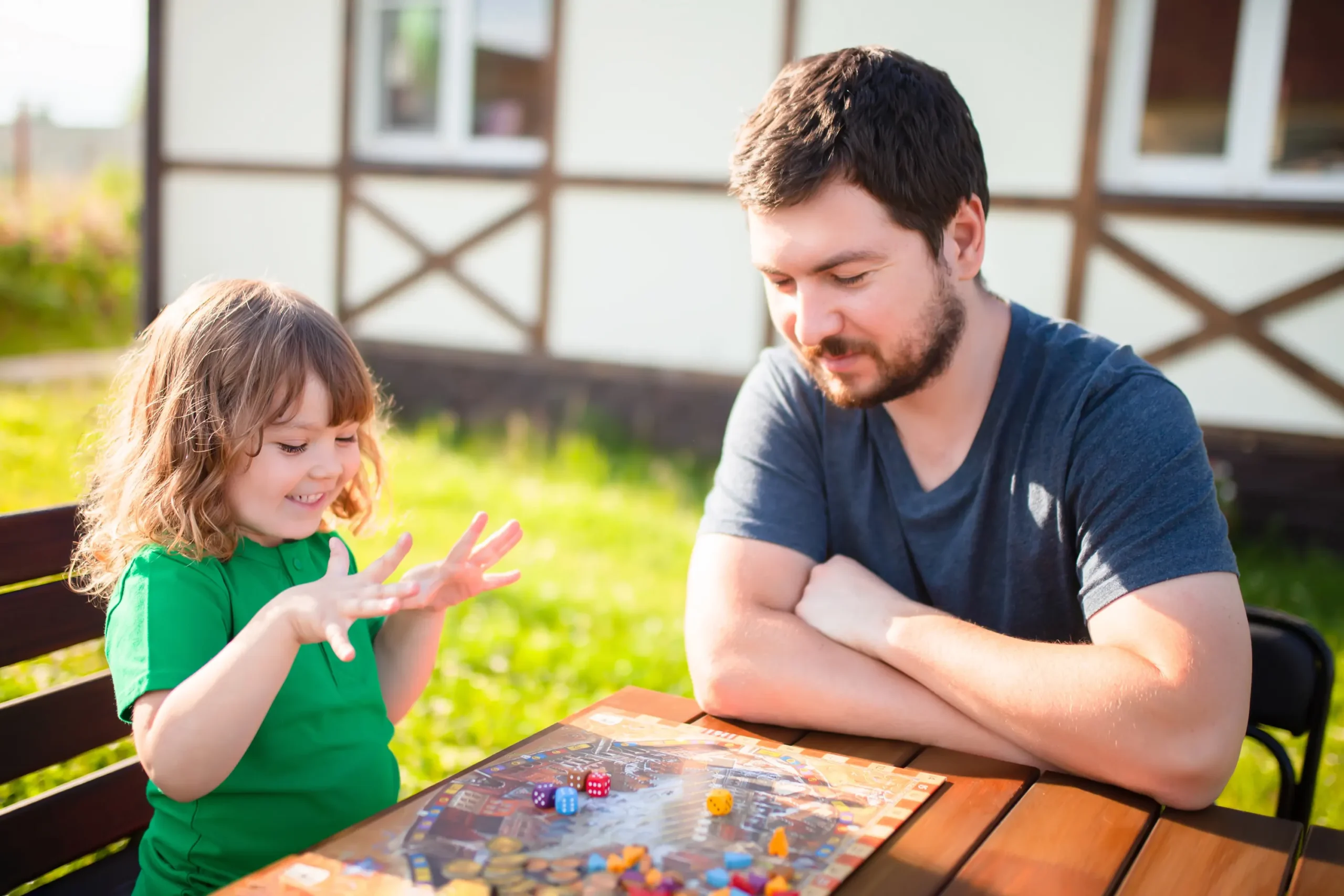
Mastering the Art of Negotiation: Dad’s Guide to Teaching Kids
Many parents struggle with teaching their kids how to negotiate. Brian, a dad, believes negotiation is an essential life skill for his children. This article will show how he teaches his kids to negotiate using simple steps and real-life examples. Keep reading to learn more!
Key Takeaways
- Kids learn negotiation skills best through real-life situations and hands-on experiences, like the dad who used a Lego building activity to teach his children about planning and strategizing in negotiations.
- Teaching kids how to negotiate involves more than just talking; it requires them to understand their emotions, listen actively, and consider others’ perspectives. This helps them in making thoughtful decisions and reaching agreements that benefit everyone involved.
- By practicing negotiation skills with various people, including family members, teachers, and peers, children learn how to adapt their approaches based on different audiences. This is a crucial skill that improves their chances of achieving favorable outcomes.
- Encouraging active listening and involving kids in decision-making not only strengthens their negotiating abilities but also boosts their confidence. It teaches them the value of empathy and respect during discussions.
- Real – world negotiation skills are essential for kids as they prepare for future challenges. Learning these skills early sets a solid foundation for handling complex situations in school, at home, or in professional settings later in life.
The Importance of Teaching Negotiation to Kids
Moving from the basics, it’s crucial to understand why kids need to learn how to negotiate. This skill plays a significant role in their cognitive development and emotional intelligence.
Teaching negotiation early prepares children for various challenges they’ll face throughout life, such as peer pressure, resolving conflicts, and making important decisions. It equips them with the ability to think critically and express their thoughts and needs clearly.
Negotiation skills also help kids navigate social interactions more effectively, whether with siblings during playtime or teachers in school settings. They learn the importance of listening actively and understanding different perspectives.
This foundation not only aids in building stronger relationships but also fosters self-awareness and empathy towards others. Early lessons in negotiation can significantly influence a child’s journey into tween years and beyond, setting them up for success in personal and professional spheres later on.
The Shift: From Santa to Real-World Bargaining
Teaching negotiation skills lays the groundwork for more advanced interactions as children grow. As they transition from believing in Santa to understanding real-world dynamics, their ability to negotiate becomes crucial.
This shift involves moving beyond simple wishes and learning how to articulate desires in a way that engages discussion and consideration from others. Kids start realizing that not all requests are met with an immediate yes, but with thoughtful strategy and communication, they can achieve desirable outcomes.
This evolution marks a significant step on the evolutionary scale of personal development for kids. They begin to see negotiations not just as a means to an end but as essential life skills that empower them in various situations—from resolving conflicts with siblings over which game to play, leveraging these techniques for school projects, or even negotiating curfew extensions during their teen years.
The dad’s experience of securing a salary bump through negotiation illustrates the practical benefits these skills offer early on, setting a foundation for future successes in both personal and professional settings.
Making Negotiation Second Nature for Kids
As we shift from the whimsical negotiations with figures like Santa to real-world bargaining, instilling negotiation as a second nature in children becomes crucial. It’s about evolving their ability to think critically and anticipate various outcomes.
Kids learn not just to ask for what they want but also to understand the importance of having a backup plan, as Brian discovered through his method of teaching negotiation skills. This approach helps kids see negotiations not as confrontations but as opportunities for creative problem-solving.
Parents can make this learning process engaging by integrating it into everyday decisions. For instance, allowing children to negotiate their bedtime on weekends or how much screen time is acceptable teaches them the value of giving and taking.
Through these experiences, children begin to manage emotions like anger more effectively and understand that reasoning and thought processes play significant roles in achieving favorable outcomes.
This hands-on practice prepares them for more complex social interactions outside home, making negotiation an invaluable tool in their toolkit for life’s challenges.
Understanding Your Audience: A Key Negotiation Skill
Understanding your audience plays a crucial role in successful negotiation, especially for kids learning this important skill. Kids often negotiate with a wide range of people – from family members to teachers and peers.
Recognizing the needs, interests, and emotions of these different groups can dramatically improve their ability to reach favorable outcomes. They learn not just to speak but also to listen actively, adapting their approach based on who they are negotiating with.
Developing this skill involves paying attention to others’ reactions and choosing the right moment to present an argument or make a request. A child’s success in negotiation doesn’t solely hinge on what they want but also on how well they can align their desires with the interests of those they are negotiating with.
Practicing empathy and understanding allows kids to navigate various social dynamics effectively, making it easier for them to achieve win-win situations in both personal relationships and future professional environments.
Practical Ways to Teach Kids Negotiation Skills
Teaching negotiation skills to kids involves involving them in decision-making and encouraging active listening. Kids should also be taught to manage their emotions and can benefit from negotiation skills training games as part of the learning process.
Involving kids in decision-making
Involving kids in decision-making allows them to practice negotiation skills. This provides an opportunity for children to express their thoughts and preferences, fostering their ability to articulate arguments and consider different perspectives when reaching a mutual agreement with parents or guardians.
Parents should establish clear non-negotiable boundaries while also encouraging open communication about the reasoning behind these decisions, promoting a healthy balance of authority and respect for children’s voices during negotiations.
Encouraging active listening
Encouraging active listening is pivotal in honing negotiation skills. By actively listening to the other party, children can comprehend and empathize with their perspectives. This skill empowers them to express their own needs effectively. Understanding this approach helps in building a strong foundation for successful negotiations.
Fostering active listening promotes open communication between kids and adults. Through attentive listening, children learn to process information thoughtfully, which aids in developing robust negotiating strategies.
Teaching them to manage emotions
Teaching kids to manage their emotions is crucial for effective negotiation. Helping them understand and identify their feelings and reactions in various situations allows them to communicate their needs more clearly.
By acknowledging their emotions, children can learn how to express themselves assertively without becoming overly aggressive or passive during negotiations. Providing a safe space for kids to share what they are feeling and teaching them techniques such as taking deep breaths or counting to ten when upset enables them to regulate their emotions effectively.
Encouraging kids to recognize the importance of managing their emotions in negotiation situations empowers them with valuable life skills. Moreover, equipping children with tools for emotional control builds self-confidence, enabling them to negotiate with others respectfully while being aware of their own emotional state.
Using negotiation skills training games
Engage kids in negotiation exercises with fun games such as role-playing scenarios and interactive activities. Encourage them to practice persuasive communication, problem-solving, and compromise. These games help children develop essential negotiation skills while having fun.
The Role of Real-World Skills in Negotiation
Negotiation involves various real-world skills and scenarios. Kids need to understand the importance of active listening, effective communication, and adaptability when negotiating.
They also need to learn how to manage their emotions and think critically about the needs and perspectives of others. These real-world skills are crucial for kids as they prepare for future interactions in school, at home, and eventually in the workplace.
Understanding your audience is key in negotiation – a skill that needs to be developed from an early age through practical experience. By teaching children these real-world skills, parents can help them navigate complex situations confidently while building valuable life skills that will serve them well into adulthood.
The Art of Negotiating with Kids: A Dad’s Approach
The dad utilized a Lego building experience to impart negotiation skills to his kids. The son’s desire to construct a challenging Lego set independently became an opportunity for the children to understand planning and strategy in negotiation.
Employing negotiation jujitsu, the dad skillfully prevented emotions from escalating throughout the process. Teaching children negotiation skills proves beneficial for their lifelong development, enabling them to advocate for positive changes and negotiate improved opportunities in the future.
Leveraging kids’ natural inclination to question decisions can effectively teach them valuable negotiation techniques.
Implementing experiences such as LEGO building enables parents to instill essential negotiating abilities in their children at an early age. This sets a solid foundation that will serve them well into adulthood when they need these skills for various life situations, including navigating social interactions, professional endeavors, and personal relationships.
By incorporating practical experiences like this one with LEGO bricks, parents can tailor their teaching towards real-world applications of negotiation skills.
Lessons from Chris Voss on Negotiating with Kids
Chris Voss, a renowned expert in negotiation, emphasizes the importance of understanding emotions when negotiating with kids. He suggests acknowledging their feelings and using empathetic statements to build rapport.
Voss also recommends actively listening to children’s concerns and involving them in the decision-making process to empower them during negotiations. These tactics can help parents create a positive and cooperative atmosphere while teaching their children valuable negotiation skills that will benefit them throughout their lives.
Conclusion
Teaching kids negotiation skills is vital for their development. Encouraging them to actively listen, manage emotions, and make decisions paves the way for success in real-world situations.
Involving children in decision-making empowers them and promotes a healthy understanding of negotiations. These practical methods lay the groundwork for shaping future negotiators with invaluable life skills.
FAQs
1. What is the “Art of Negotiation” for kids?
The Art of Negotiation for kids involves teaching them how to discuss and reach agreements in a respectful way, considering everyone’s reasons and needs.
2. Why should parents teach negotiation to their children?
Teaching negotiation helps children develop important social skills that they can use at home, with friends, and on social media platforms as they grow into teenagers.
3. How can dads approach teaching negotiation to their teens?
Dads can start by setting examples in everyday situations, guiding their teens through the thinking process during discussions, and encouraging them to express their reasons clearly.
4. What role do programs on negotiation play in parenting?
Programs on negotiation offer structured ways for parents to introduce the concepts of fair exchange and understanding different viewpoints to their children, enhancing family dynamics.
5. Are there benefits beyond better communication when kids learn negotiation skills?
Yes! Kids who learn negotiation skills often show improvements in problem-solving abilities and are better equipped to handle peer pressure on social media platforms and other teen-related challenges.




